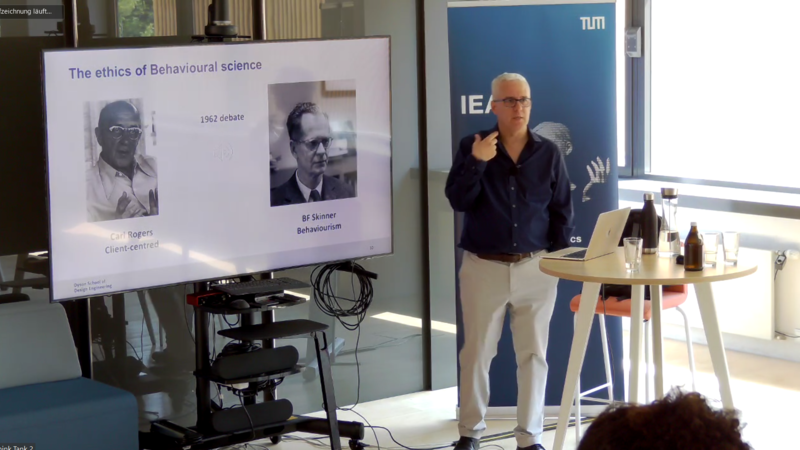On June 15th, Professor Rafael Calvo delivered an insightful talk on “Value Tensions in the Design Engineering of Intelligent Systems” as part of the IEAI Speaker Series, which took place at the TUM THINK Tank. During the event, he shared the inspiration behind his chosen topics, tracing it back to his family’s history in countries with autocratic governments during the cold war era. Driven by the belief that all technologies should prioritize well-being, Professor Calvo emphasized the importance of developing models, methods, and empirical evidence for designing technologies that enhance well-being. He highlighted the need for design engineers to integrate various engineering, design, and innovation approaches.
In his talk, he introduced affective computing, which combines computer science and psychology to enable computers and machines to recognize, interpret, and respond to human emotions. With the emergence of such systems, Professor Calvo stressed the necessity of establishing ethical guidelines to ensure their quality and effectiveness. Additionally, he underscored the ethical value of understanding the intended individuals of these systems.
Professor Calvo elaborated upon the Biomedical Ethics framework, which he finds particularly helpful. It focuses on principles such as well-being and human autonomy. The Self-Determination Theory by Richard Ryan and Edward L. Deci was also highlighted as a valuable tool, emphasizing the importance of satisfying individuals’ psychological needs for autonomy, competence, and relatedness to promote motivation.
He argues that design engineers can use these ideas to create the environments where we live. Environments that can either support or hinder well-being. He gave examples of how affective computing can fit into learning technologies, supporting relatedness through technologies that enable communication skills, and finally, strengthening autonomy by endorsing aligned goals and values.
Professor Calvo then went through the history of the development of AI Ethics and further explained findings by ethicist Joseph Weizenbuam, who defined the difference between deciding and choosing, the former being logical and computational. The latter relates to motivation and is a product of “judgment”. Therefore, it could include emotions, compassion, and human values. This is at the core of many discussions today, given the debate around the impact of AI on human autonomy and the development of ethical frameworks which regulate the use of development of AI, such as the EU AI Act.
For this reason, one of the biggest challenges for AI researchers today is not to develop autonomous systems but to support human autonomy. To address this, Professor Calvo presented his approach to managing value tensions through choosing the right project, engaging with various stakeholders, respecting the law, and continuously critiquing the design process.
In order to implement this approach, Professor Calvo introduced the METUX model (Motivation, Engagement, and Thriving in User Experience), which he co-developed with Dorian Peters and Richard M. Ryan. This model offers a psychological research-based framework that enables HCI researchers and practitioners to derive insights regarding how technology designs either facilitate or hinder fundamental psychological needs to improve the user experience and guide actionable steps in technology development.
This presentation then concluded with an interesting discussion between Professor Calvo and participants on affective computing, how it could be used to support psychological well-being, and the software development behind it. The IEAI would like to thank Professor Calvo for his compelling talk and for discussing this important and highly relevant issue with the IEAI community.
Rafael Calvo | June 15th, 2023

